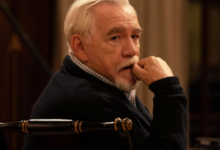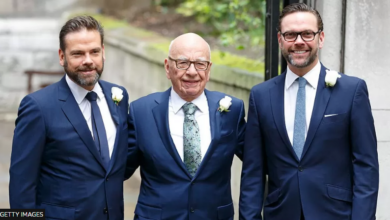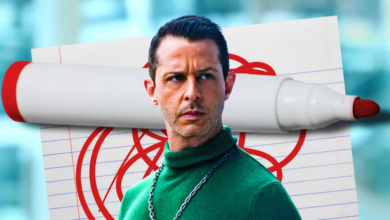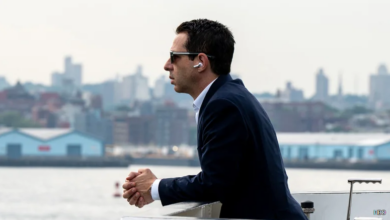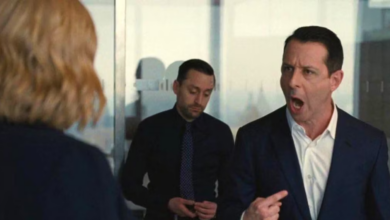‘Succession’ Director Mark Mylod Talks Shiv and Kendall’s Post-Finale Whereabouts and Roman’s Cut Line
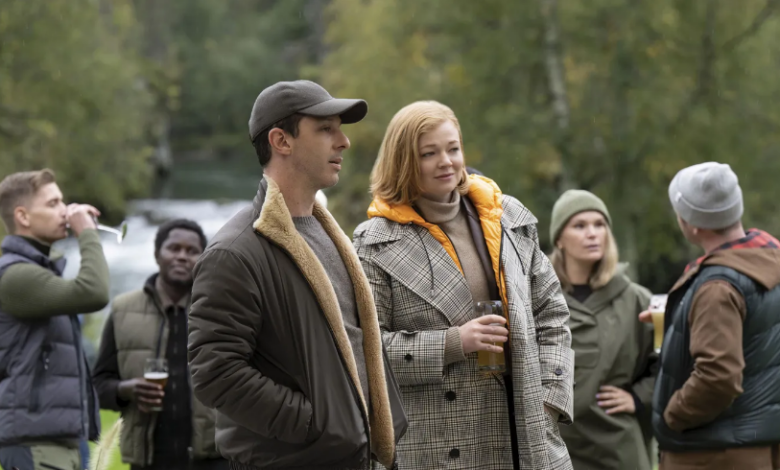
The longtime helmer, who directed the acclaimed May 29 series finale, talks to The Hollywood Reporter about the Roy family endings, those record-breaking Emmy nods and why he wouldn’t dare speak for Brian Cox.
Succession may have wrapped its Emmy-winning four- season run, but feelings from the May 29 series finale linger. Viewers of the Roy family saga were left haunted by the final boardroom face-off among siblings Kendall (Jeremy Strong), Shiv (Sarah Snook) and Roman (Kieran Culkin), with many wondering how each could have gone on to pick up the pieces after the Jesse Armstrong-created series faded to black. Longtime director Mark Mylod admits he, too, finds himself thinking about the trio as he shares some insight into the character endings while chatting about the show’s record-breaking 27 Emmy nominations.
“I feel really good about [ending with the fourth season], having seen shows and been part of shows that I think have perhaps overstayed their welcome,” says the helmer nominated for “Connor’s Wedding,” the episode that saw the death of series patriarch Logan Roy, played by Brian Cox. “But the lovely thing about the nominations is that it’s a celebration of not messing up the final season. When we set out for each new season, there was always the terror of: This will be the one not quite as good as last season. To have it so well received was such a massive relief.” Mylod spoke with The Hollywood Reporter about simultaneously missing the Roy family and recognizing the right place to close Succession.
We spoke after the series finale, when everyone was still digesting the ending. You said, “I find myself in the most strange way wondering what they’re doing now, like a friend that I’ve lost contact with. It’s a very strange feeling, like a phantom limb.” How often do you think about Kendall, Roman and Shiv now?
I still miss them. I miss the characters. But it’s morphed into the real-life person, into the actors that I miss more presently now. Particularly, those who don’t live close: Sarah Snook is back in Melbourne [Australia] with her new daughter; Jesse Armstrong, Becky Martin, Tony Roche, Lucy Prebble and Will Tracey are all in London. So I miss the camaraderie. And that’s become more present than that haunting feeling with the characters. That feels like a bit of a fever dream on some level. It doesn’t feel present in the same way. But I know I’ll always miss it.
I have some questions that are still burning. How do you envision Shiv is playing her hand as CEO Tom’s [Matthew Macfadyen] wife?
It’s a strange question. Obviously, it’s massively subjective. But I do play those games. Shiv, of any of the siblings, is the one we left off with who was in the strongest position. Albeit, a very delicate position with a radically redrawn power dynamic between her and Tom. But, she is in a position. You can call her Lady Macbeth. She is adjacent to power; adjacent to the crown. And although Tom is at least an equal in terms of the power dynamics now, she still obviously is in a position of tremendous influence.
When it comes to Kendall’s final shot, do you think he is still alive in the world of Succession? And if so, do you think he has made any reconciliations? [Editor’s note: Jeremy Strong said he thought Kendall would not survive.]
I very much hope that he’s still alive. I think he is. That’s subjective. Other players in the show might disagree. My subjective opinion would be that he will probably go through a number of stages of grief with some cockamamie plans that perhaps won’t amount to much. But I have to be optimistic in the way of if one has a relative or even a child who is experiencing problems with their identity and role in the world: You have to hope they will find themselves and their place in the world.
Jesse Armstrong revealed there was a cut line of dialogue from Roman’s final scene. Can you share it? And, do you still picture him sitting at a bar ordering Gerri’s [J-Smith Cameron] drink?
I feel that character has a lifetime of wearing a mask. It’s a false setting to slip behind it and pull up the drawbridge, emotionally. His longterm happiness or contentment, I don’t feel optimistic about that. His ability to connect in any meaningful way is so torpedoed by his upbringing that I fear for any emotional connection of meaning. But I don’t fear for his physical well-being. I think he can wear that mask so efficiently, it probably feels like the real him sometimes to be that witty, deliberately offensive court jester.
The line we cut I am happy to share. He walked into the bar where, in our head there was a barman he already knew from fairly regular visits, and the line was, “What up, motherfucker?” Which was a bookend to the very first line of dialogue that we heard Roman speak back in season one, episode one. I imagine that Jesse’s intention there was to show the cyclical nature of Roman’s journey. That for all that illusion of evolution, on some level those four seasons over which we followed Roman was some kind of fever dream, and he finds himself right back where he started.
The finale gave the audience a lot to think about with the main characters. And then there were smaller questions left open-ended intentionally. What’s the most common question you get since wrapping Succession?
The true answer is that I don’t get asked many questions because I’ve been keeping my head so low. If they do happen, it tends to be, “Did you consider doing a fifth season?” More of that lovely hunger from fans of the show for the story to continue and for us to continue being voyeurs or passengers or whatever we may be going along with the ride for their various disasters. It tends to be that kind of fantasy wish-fulfillment of: What if we could continue watching what happens next?
One thing I’m left thinking about is that finale hug, when Kendall seems to be painfully pressing against Roman’s face stitches. Any more to unpack there?
Where he opens up the wounds? I can’t think of another hug between them. I don’t know if I have more to add. The moment remains so complex that unpacking it almost feels like too much of a reduction of the elements of bullying, masochism and love that are so inextricably woven in that moment [when the brothers hug]. It’s almost impossible to define. That’s why it remains one of our most powerful scenes because of that extraordinary cocktail.
The show broke records with its 27 Emmy noms — and for the first time, three actor leads are competing in the same category. What was that day like?
There were certain nominations that felt really special, specifically Alan Ruck. He has, over four seasons, been incredibly supportive and patient and, often in parallel with his character, Connor, has put in brilliant work that has gone somewhat unrewarded in the terrible kind of Darwinian narrative stakes of the final edit. Our edits would always come in so long — an hour and a half on a cut. In the final edit, we would always find ourselves having to follow the main narrative, and anything that wasn’t following that A or B narrative had to go at some point. There would very often be really beautiful work from Alan and Justine Lupe [who played Willa], and I know sometimes that was frustrating for him, particularly in the early seasons. And in season four, we were able to fold Connor into the lead narrative much more inclusively and effectively, and he was therefore able to shine accordingly because we were giving him the material. I was really, really happy for Alan and for all of my colleagues — those guest actors who did such brilliant work. To see so many of them recognized across the board, across the line — nothing but pride.
What are you most proud of to be recognized for with “Connor’s Wedding,” the episode that featured Logan Roy’s death and for which you are nominated?
The team effort. Obviously, it starts with brilliant writing from Jesse. When you read a script that is that powerful and you know you are somewhat responsible for delivering an episode that does justice for the passing of a great and powerful and important character, at least in our world, there’s a huge fear and apprehension. We did our best to do that moment in our story justice with a really interesting narrative take, to put ourselves at such a distance from the immediate action on the plane and to keep the focus on the frustration of the children. That frustration of not being able to see around the corner can parachute the audience into that experience of the siblings. And when we’re able to do that, we’re at our most effective emotionally and narratively.
Matthew Macfadyen stayed on the phone for Sarah Snook’s lines. Is there anything else behind the scenes that helped those performances amid the real-time shot, where they find out about Logan’s death?
It wasn’t just Matthew; the rest of the team who were also on the phone [were] also in a room somewhere for days on end, waiting for a half-hour on standby to put their cappuccino down and gear themselves up to give that emotional intensity to the actors. That was a creed throughout the show: for everybody to be there on the other side of any emotional phone call. It was an honor system. This was definitely the zenith of that idea because it was over a period of days. What I’ve always done with incredibly tense episodes is to make the schedule as chronological as possible so that everybody can experience it moment by moment, so that we can build on our experiences page by page. It was problematic in the finale because of the Barbados section of shooting [where the three Roy siblings visit their mother, Lady Collingwood]. But whenever we could, we would shoot it chronologically, and I think the benefit to the actor’s performance was huge.
Cox recently said he understood the decision to kill Logan so early but wished he had more time on the season. Now that he’s been nominated as best actor, do you think he’s come around?
I hope he’s proud of that [nomination from only three episodes]. But I’ve learned long ago not to speak for Brian Cox. He is very much a man of his own mind. You can ask him!
The 2024 Emmys telecast remains up in the air amid the ongoing WGA and SAG-AFTRA strikes. [Note: After this interview, a new date was set for Jan. 15.] Jesse and your writers have been on the picket lines in solidarity with the WGA, using the Succession writers room as an example of why he’s supportive of their priorities. What are some ways you’ve seen Succession work where it could be modeled after?
Hopefully it’s self-evident that the massive proportion of the show’s success is brilliant acting and brilliant writing. They are basically the tentpoles of any film and television project. The way we consume that content over the past few years has revolutionized so quickly, and the way we compensate those artists has not. So all I can do is stand in solidarity with those people until they are paid a fair wage. This has gone on far too long when of course they should be paid fairly. Why isn’t it happening?

